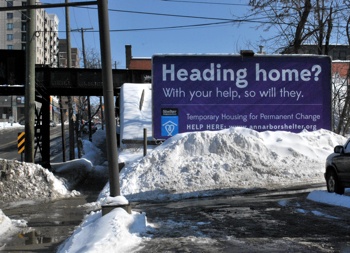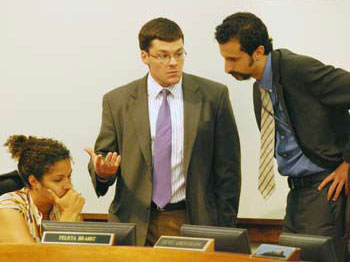County Board Briefed on Shelter Services
Washtenaw County board of commissioners working session (Feb. 6, 2014): Following a large turnout of homeless advocates at their Jan. 22, 2014 meeting, county commissioners received an update from the leader of the Shelter Association of Washtenaw County, which operates the Delonis Center shelter near downtown Ann Arbor.

Billboard on West Huron, facing eastbound traffic, to seek support for the Shelter Association of Washtenaw County. The Delonis Center homeless shelter is located across the street. (Photos by the writer.)
Ellen Schulmeister, the Shelter Association’s executive director, called this season “The Winter of Great Effort,” with harsher weather and more demand for services. She described efforts to shelter the homeless in the short term, but noted that the broader goal is to find housing and provide support services to eliminate chronic homelessness.
Schulmeister reported that the county’s funding to the Delonis Center had been cut during the economic downturn, and she hoped that levels would increase. ”We need you to do that,” she said.
Washtenaw County government owns the building where the Delonis Center is located, and pays for maintenance. In addition, the county provided $51,230 for the Delonis Center in 2013 and increased that amount to $160,000 this year. The county funding is set to increase again to $200,000 in 2015 and remain at that level through 2017. The Shelter Association’s annual budget is $2.583 million.
Yousef Rabhi, chair of the county board, called the Delonis Center’s work ”inspirational,” but noted that the issue needs to be addressed by the entire community. He’s working to organize a summit, bringing together stakeholders from the government, nonprofits and other entities working to end homelessness. Rabhi said the effort should include representatives from the Ann Arbor District Library – because the downtown library serves as a de facto shelter during the day, even though that’s not the library’s purpose.
Schulmeister agreed on the importance of partnerships, adding that the barriers also include a lack of affordable housing and jobs. “It takes a community to house someone – it really does,” she said.
The Feb. 6 working session also included an update from Barbara Niess-May, executive director of SafeHouse Center, a shelter for survivors of domestic violence and sexual assault. As with the Delonis Center, the county also owns the SafeHouse building and pays for maintenance, as well as providing funding for the nonprofit’s services.
Niess-May told commissioners that she’s been doing this work for 20 years, but this is the worst time for funding she’s seen for these kinds of programs. She pointed out that funding from the county has dropped to $48,000 annually through 2017, and she hoped that the amount could be increased. The total SafeHouse budget is $1.4 million.
Dan Smith (R-District 2) noted that the number of people that SafeHouse serves each year – more than 5,000 – represents almost 2% of the county’s population. He highlighted the fact that Washtenaw County has fewer domestic violence homicides per capita than any other county in the state. To him, a statistic like that directly connects to the county’s mandates because of the clear reduction of work load on the court system and jail, as well as the number of lives saved. He considered SafeHouse part of the county’s mandate for public safety and justice.
Conan Smith (D-District 9) observed that the board has discussed the option of a human services millage that would support services like those that SafeHouse offers. He encouraged Niess-May to include the county’s funding cuts as part of her communications to others in the community. It might lead them to support raising additional revenue for SafeHouse and other organizations, he said. [Full Story]




